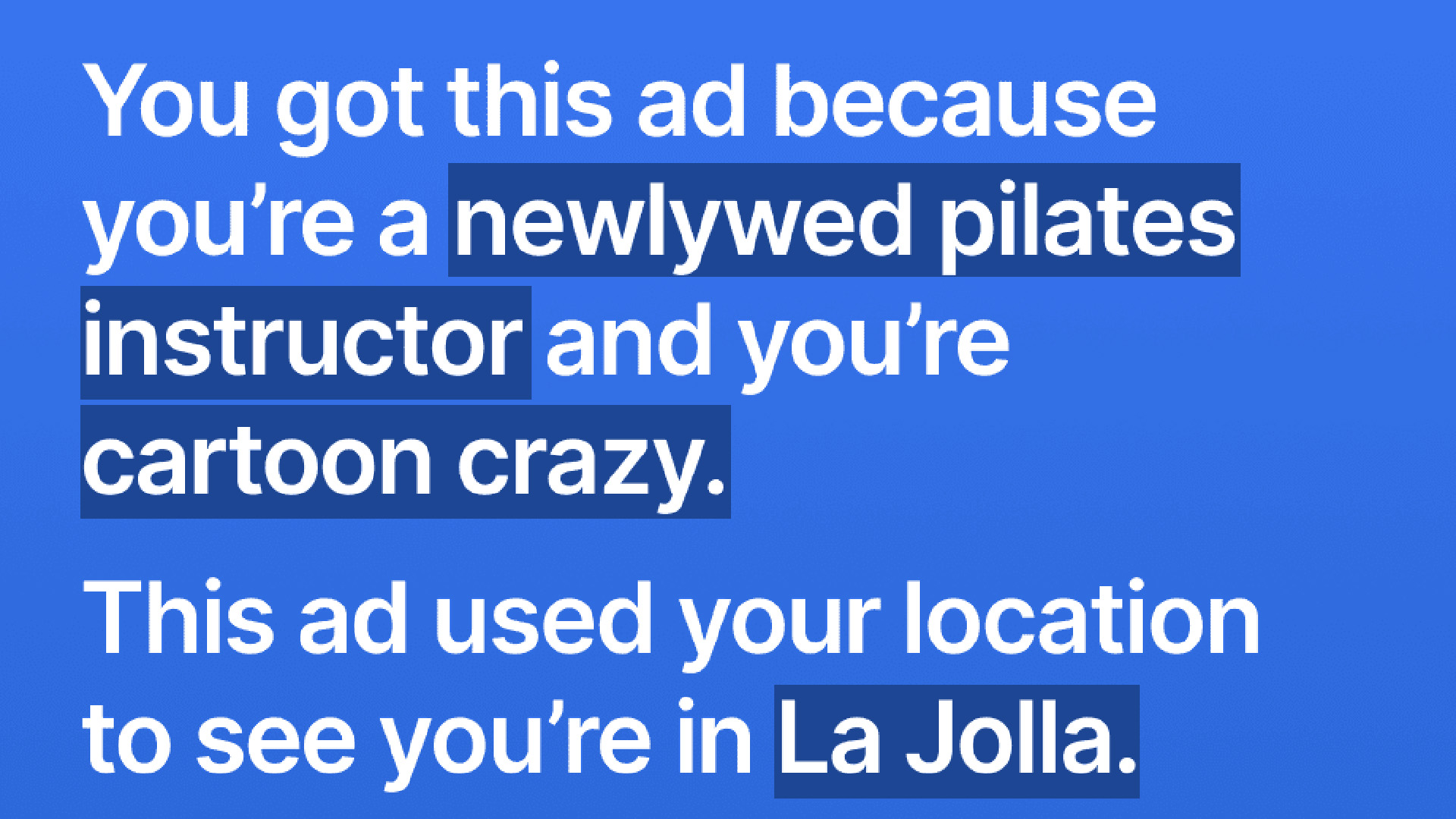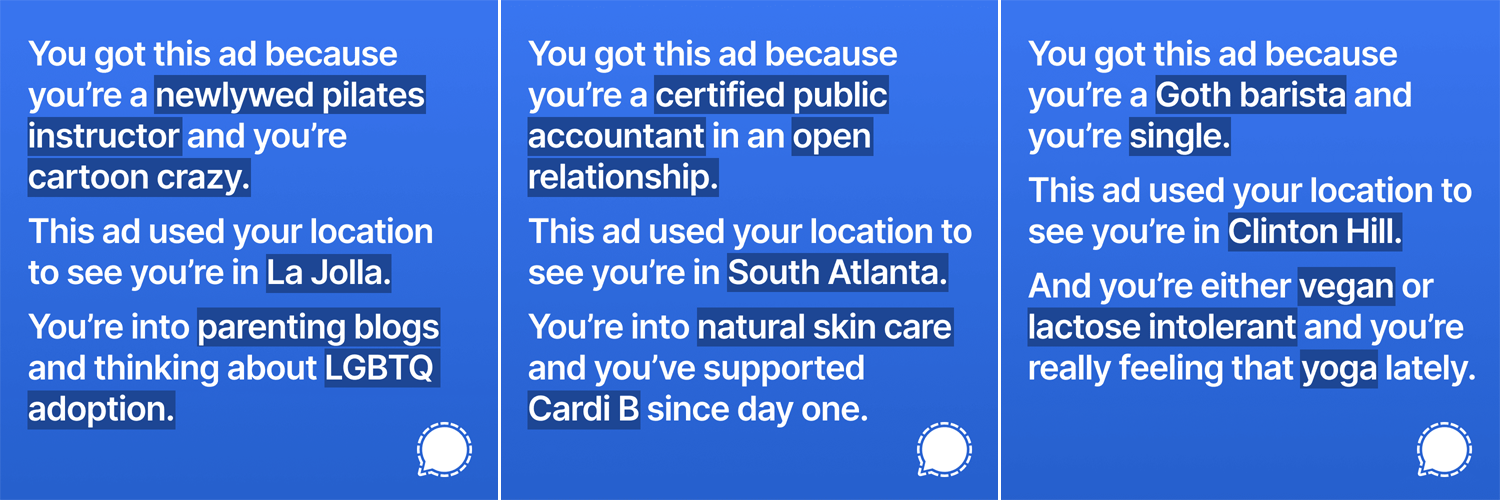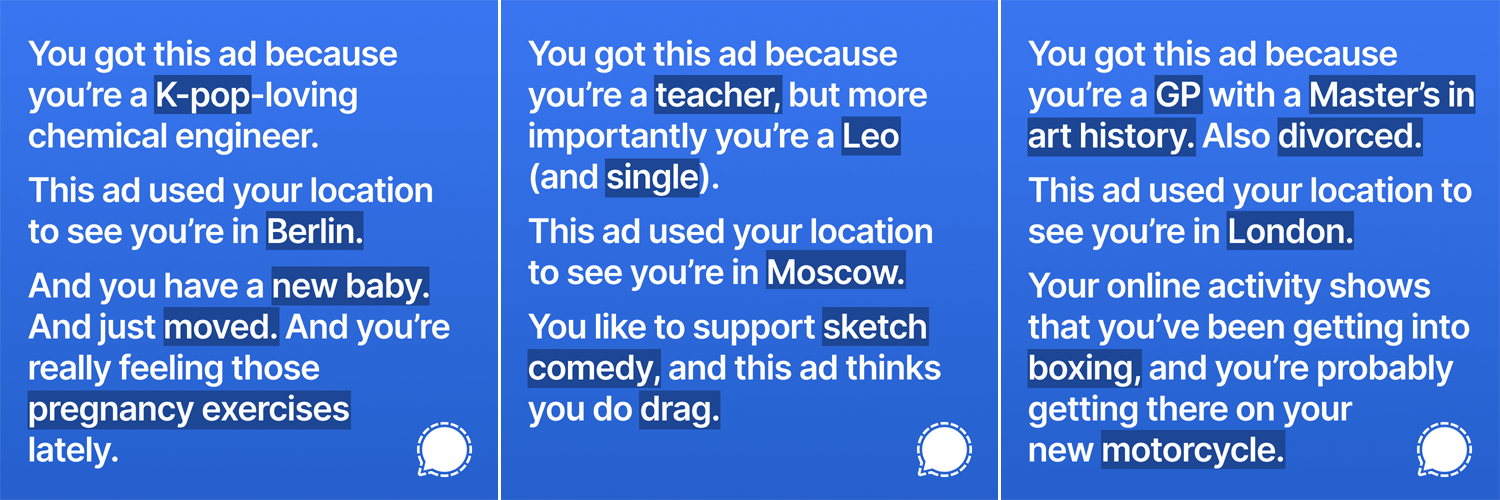Facebook doesn’t want to remind you how much it knows about you
A recent series of Instagram ads were banned for being too honest, because the truth will scare people


When Signal tried to run a series of ads on Instagram that described exactly why the viewers were being targeted, the ads got banned. Was it a stunt? Probably. But did it highlight the dissonance of the Facebook ads platform? Definitely.
Facebook, once a way to rate college girls, has become a global platform with literally billions of users (2.8 billion at last count). While to most users it’s a way to share pictures of your pets, kids and COVID vaccine certificates, it is essentially an advertising platform – much like Google.
With revenue of $26.1 billion in the first quarter of 2021, Facebook’s biggest currency is data. The details of your life that you have entered into your profile, from your birthday and where you live to your favorite band or what you like to eat. This data is used to allow advertisers to target their ads at those people most likely to want the product or service. It's also the reason why Apple's new tracking transparency is a threat to Facebook's income – unless you choose not to allow, it can track your activity across different tabs or apps while Facebook remains open.
- Google Maps update makes planning road trips much easier
- I love OnePlus Watch, but Apple Watch's incoming upgrade has me envious already
- Forget the Tesla Cybertruck, the Hummer EV is the new eco king
Advertisers love specific ads because they get better returns and allow them to direct a campaign to a very specific group of people. Google offers the same thing through its display and search ads, however, placing these ads right into your Facebook or Instagram feed can be even more effective. We become blind to banner ads, as we know they are trying to sell us something, and we skip past the paid search result terms, as we know they are paid. But placed in between Katie’s kitchen disaster and Claire’s new puppy, we are more likely to give it a read.
I’ve used Facebook ads, and they work. If you want to target British people between the ages of 25 and 45 that live in Chicago, you can. If you want to reach those couples that have just got engaged, you can do that too. And because it’s so targeted, it costs less to promote.
There are huge benefits to this ultra-targeted advertising, both for the advertiser and the user. Yes, the company advertising can get more sales or engagement because it can speak to those most likely to want the product or service, but for the user, you get ads that are relevant to you. It could be a concert from your favorite band, a site selling engagement rings or a rental agency in your area. Surely, it’s better to get ads for things you like than things you don’t?

The issue is that Facebook users – and internet users in general – are in the most part, blissfully unaware of the data they are giving out to these companies. So that when they discover that Facebook knows everything about their lives, they tend to freak out. It can be unnerving to discover how much data we share. After Facebook allowed users to download their information, some users were shocked. Unfortunately, there have also been leaks of that data, as happened in 2019, with details from over 500 million accounts shared online for free.
Get all the latest news, reviews, deals and buying guides on gorgeous tech, home and active products from the T3 experts
Wired Magazine UK ran a special subscriber cover back in 2011 where they printed individual versions for a select number of people that listed some of their personal information found online. The results were scary, but an interesting experiment.
So when Signal wanted to make it clear to its audience exactly why they were being targeted – down to the job title, location and latest life events, it was at risk of shattering that one-way glass.
According to the original report in Gizmondo, Facebook claims that the ads were never actually placed in its system and if they had some of them would have been rejected, as its policies don’t allow ads that target specific medical conditions or sexual orientation. Signal meanwhile claim they did try and post them and were banned for it.

Interestingly, Facebook didn’t suggest that it wouldn’t be possible to target for those factors, just that it’s not allowed. Whether Signal did or did not place the ads doesn’t really matter. They were just making use of the full scope of Facebook’s targeting – and then being completely transparent with the user, as to how it got there.
Data privacy is of course an issue, and you should make sure that any data you do put online is kept as private as possible, by making sure your privacy settings are up to date and your passwords are strong. However, I think targeted ads are a good thing, for the customers and the advertiser. Facebook just needs to be transparent on this, if it wants people to keep adding more information.

As T3's Editor-in-Chief, Mat Gallagher has his finger on the pulse for the latest advances in technology. He has written about technology since 2003 and after stints in Beijing, Hong Kong and Chicago is now based in the UK. He’s a true lover of gadgets, but especially anything that involves cameras, Apple, electric cars, musical instruments or travel.